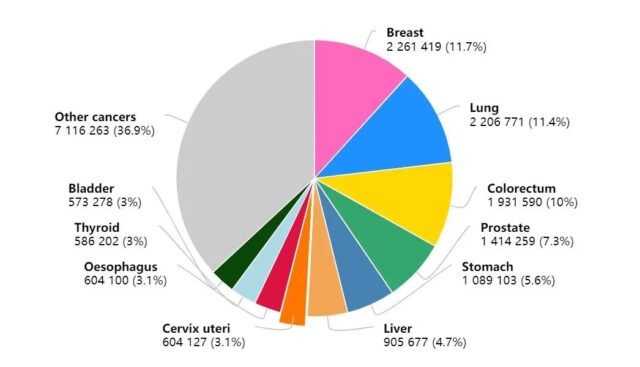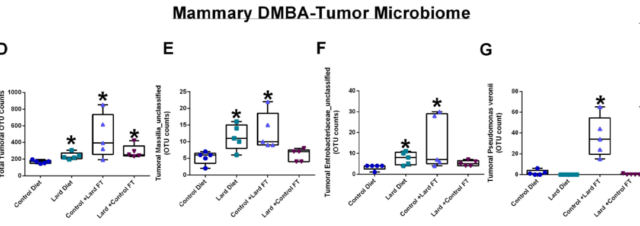Diet can change intestinal and breast flora and affects breast cancer risk
- Normal Liver Cells Found to Promote Cancer Metastasis to the Liver
- Nearly 80% Complete Remission: Breakthrough in ADC Anti-Tumor Treatment
- Vaccination Against Common Diseases May Prevent Dementia!
- New Alzheimer’s Disease (AD) Diagnosis and Staging Criteria
- Breakthrough in Alzheimer’s Disease: New Nasal Spray Halts Cognitive Decline by Targeting Toxic Protein
- Can the Tap Water at the Paris Olympics be Drunk Directly?
Studies have found that Diet can change intestinal and breast flora and affects breast cancer risk
Diet can change intestinal and breast flora and affects breast cancer risk. Diet can change the gut and breast microbiota and play a key role in breast cancer. Potential interventions may reduce the risk of breast cancer.
In January 2021, the World Health Organization’s International Agency for Research on Cancer (IARC) released the latest global cancer burden data for 2020. The most striking change in this latest cancer burden data is that breast cancer has replaced lung cancer as the world’s largest cancer.
In 2020, the number of new breast cancer patients worldwide reached 2.26 million, exceeding the number of new lung cancer cases for the first time. In many countries, the incidence of breast cancer is also increasing year by year. In 2020, the number of new breast cancer cases in China exceeds 410,000, and the problem of breast cancer prevention and treatment is becoming more and more serious.

The top ten cancer types with the number of new cancer cases in 2020
Obesity is a common risk factor for breast cancer. Data show that the mortality rate of breast cancer in obese patients is three times higher. As we all know, obesity is related to high-fat diet. Previous studies have shown that poor eating habits such as high-fat diet can change the body’s metabolic signals, leading to obesity, and also affect the occurrence and prognosis of breast cancer.
The microbiota is a collection of microorganisms living in a specific environment of the human body. When talking about the microbiota, people first think of the gut microbiota, but in fact, there are also microbiota in the breast, and they are closely related to breast health and breast cancer. A 2018 study by the Wake Forest University School of Medicine in the United States showed that the breast microbiota, like the gut microbiota, can also be affected by diet and respond accordingly, but do these microbiota play a role in the impact of diet on breast cancer? The role is not clear.
Recently, the Katherine Cook research team of Wake Forest University School of Medicine in the United States published an online research paper titled Diet alters entero-mammary signaling to regulate the breast microbiome and tumorigenesis in Cancer Research.
The study found that diet can change the gut microbiota and breast microbiota, and further discovered that diet including fish oil supplements can not only change these microbiota, but also breast cancer tumors. The study highlights that dietary interventions may help reduce breast cancer risk.

First, the research team administered high-fat or low-fat diets to mice susceptible to breast cancer, and found that mice on a high-fat diet had more tumors, developed faster, and were larger, which was confirmed on the basis of previous studies. The correlation between diet and breast cancer.

Next, the research team performed fecal bacteria transplantation on the mice on the two diets, and was pleasantly surprised to find that the number of breast tumors in the low-fat diet mice after the fecal bacteria transplantation from the high-fat diet mice became the same as the high-fat diet There are as many groups, indicating that the gut microbiota can transfer diet-mediated breast cancer risk, highlighting the important link between microbiota and breast health.

More importantly, the research team also conducted a double-blind placebo-controlled clinical trial in which breast cancer patients took cod liver oil dietary supplements or placebos for 2-4 weeks before surgery.
The results showed that in patients who took cod liver oil for a long time (4 weeks), the proportional abundance of lactic acid bacteria in the normal breast tissue adjacent to the tumor was greatly increased. Lactic acid bacteria have been shown to reduce the growth of breast cancer tumors in preclinical disease models, indicating that the dietary intervention of this cod liver oil dietary supplement has potential anti-cancer properties.
At the same time, the research team found that the proportional abundance of Bacteroides and Rumenococcus decreased in breast tumors of patients who ingested cod liver oil, but its significance is still unclear and needs further study.
The article’s corresponding author, Katherine Cook, said that this study further proves that diet can change the intestinal and breast microbiota and play a key role in breast cancer. Potential interventions may reduce the risk of breast cancer.
All in all, this study helps people better understand the relationship between the microbiome, diet, and breast cancer risk, and highlights the potential of dietary interventions to prevent and treat the microbiota of breast cancer, and further contribute to the clinical risk of breast cancer. Prevention and treatment provide new ideas.
(source:internet, reference only)
Disclaimer of medicaltrend.org
Important Note: The information provided is for informational purposes only and should not be considered as medical advice.



